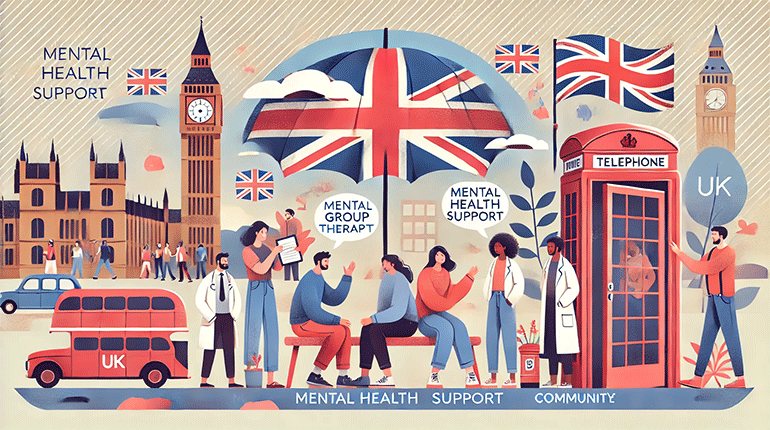Understanding Mental Health in the UK: A Comprehensive Guide to Resources and Support
Mental health is a vital component of overall well-being. While significant progress has been made in addressing mental health challenges in the UK, stigma, access to care, and awareness gaps remain. This guide delves deeply into mental health issues, the support systems available, and actionable steps to foster well-being.
What is Mental Health?
Mental health is the foundation of emotional, psychological, and social functioning. It influences:
- Emotions: How we manage stress, sadness, and joy.
- Thoughts: Perceptions of ourselves and the world.
- Behavior: How we interact with others and handle daily challenges.
Mental health isn’t static. It can fluctuate due to factors such as stress, trauma, or genetic predisposition. Early intervention and understanding are essential for maintaining long-term well-being.
Why Mental Health Matters
Mental health is intertwined with physical health and societal well-being. Poor mental health can lead to:
- Physical Ailments: Chronic conditions like heart disease or obesity.
- Economic Impact: Lost productivity costs UK businesses billions annually.
- Relationship Strain: Affecting family, friendships, and community ties.
- Risk of Suicide: The ultimate tragedy of untreated mental health conditions.
In the UK, the scale of mental health challenges is evident. According to NHS Digital, one in four adults experiences mental illness each year, with an increasing prevalence among younger demographics.
Key Mental Health Challenges in the UK
1. Common Disorders
- Depression: Characterized by persistent sadness, fatigue, and loss of interest.
- Anxiety Disorders: Including generalized anxiety disorder (GAD), panic attacks, and phobias.
- PTSD: Often affecting veterans, survivors of abuse, and accident victims.
2. Youth Mental Health
Young people face unique pressures:
- Social Media: Comparing lives online can fuel self-esteem issues.
- Academic Pressure: Exams and future career concerns.
- Bullying: In schools or online.
The NHS Long Term Plan highlights children’s mental health as a priority, yet demand often outstrips available services.
3. Workplace Stress
- Causes: Overwork, lack of support, and job insecurity.
- Impact: A leading cause of absenteeism; nearly 17 million working days lost in 2023.
4. Post-Pandemic Mental Health
The COVID-19 pandemic amplified mental health issues:
- Loneliness: Social isolation worsened pre-existing conditions.
- Grief: Many are struggling with loss and uncertainty.
- Economic Stress: Unemployment and financial instability increase anxiety.
Comprehensive Resources for Mental Health Support in the UK
1. NHS Mental Health Services
The NHS is the backbone of mental health care in the UK. Services include:
- GP Consultations: The first step in seeking help. GPs assess symptoms and provide referrals.
- Talking Therapies: Programs like Improving Access to Psychological Therapies (IAPT) offer counseling and cognitive behavioral therapy (CBT). These services are free but may have waiting lists.
- Community Mental Health Teams (CMHTs): For severe conditions like psychosis or schizophrenia.
2. Charitable Organizations
Charities fill vital gaps in mental health care:
- Mind: A national charity offering helplines, resources, and advocacy.
- Samaritans: A 24/7 helpline for crisis support (Call 116 123).
- YoungMinds: Focuses on children’s mental health.
- Rethink Mental Illness: Provides services and advice for severe mental health conditions.
3. Digital and Online Resources
Technology has revolutionized mental health care:
- Togetherall: A safe, anonymous online community.
- Mental Health Apps: NHS-approved tools like Sleepio, WorryTree, and My Possible Self.
- Helplines: Text services like Shout (Text 85258) for immediate support.
4. Support for Marginalized Groups
Tailored services are crucial for reaching all populations:
- Black Minds Matter UK: Culturally appropriate counseling for Black individuals.
- LGBTQ+ Services: Stonewall and LGBT Foundation provide inclusive mental health resources.
- Veterans’ Support: Combat Stress offers specialized care for ex-military personnel.
5. Private Mental Health Services
For those who can afford it or need immediate care, private therapy offers:
- Shorter Waiting Times: Often available within days.
- Specialized Therapies: Like EMDR for trauma or advanced CBT.
Accessing Help
Navigating the mental health system can be daunting. Here are clear steps:
- Talk to a GP: GPs are often the first contact for mental health concerns. They assess symptoms and suggest next steps.
- Seek Immediate Help in Crisis: Dial 999 for emergencies or contact a crisis helpline like Samaritans.
- Use Self-Referral Options: Many IAPT services allow patients to bypass GP referrals.
- Explore Local Councils: Councils often list mental health resources tailored to communities.
Promoting Mental Well-being
Preventing mental health issues is as important as treating them. Key strategies include:
- Healthy Lifestyle Choices: Regular physical activity, balanced nutrition, and good sleep hygiene.
- Building Resilience: Learning to cope with stress through therapy, mindfulness, or peer support.
- Social Connections: Fostering strong relationships can buffer stress.
- Avoiding Substance Abuse: Alcohol and drugs often worsen mental health conditions.
Reducing Stigma
Despite progress, stigma remains a barrier to seeking help. Ways to address this include:
- Education: Schools and workplaces should include mental health literacy programs.
- Open Conversations: Normalizing discussions around mental health reduces shame.
- Advocacy: Supporting campaigns like Time to Change, which works to end discrimination.
The Role of Employers
Employers can play a pivotal role in supporting mental health by:
- Providing Employee Assistance Programs (EAPs).
- Offering flexible working arrangements.
- Training managers to identify signs of mental distress.
Looking Forward: A Call to Action
Mental health is a shared responsibility. Governments, healthcare providers, employers, and individuals must work collaboratively to ensure everyone has access to care and support. With the right resources, the UK can continue building a society where mental health is prioritized and stigma is eradicated.

